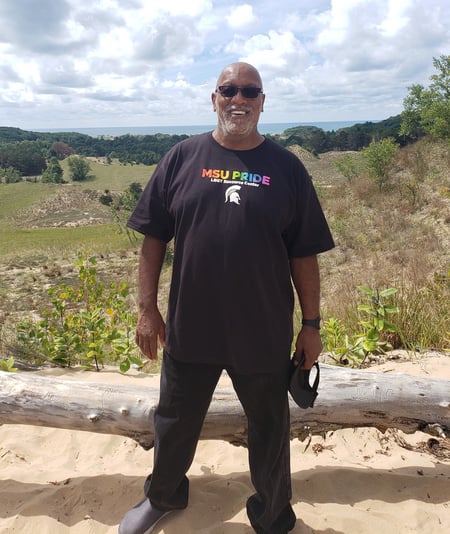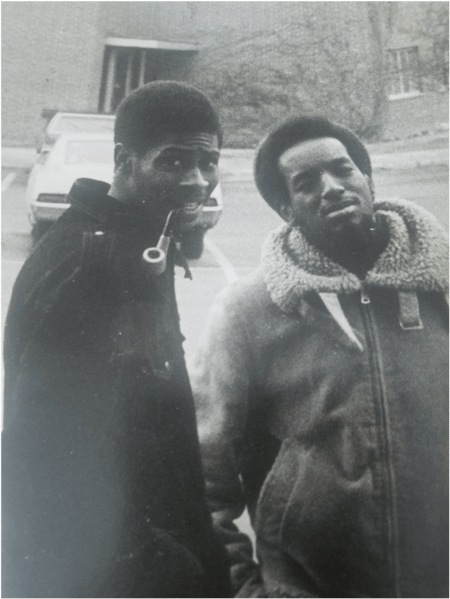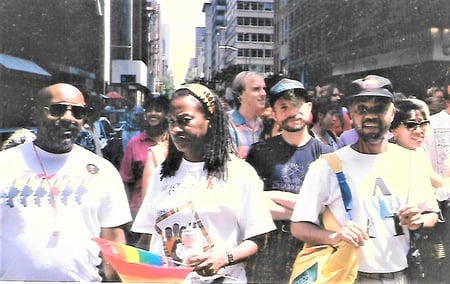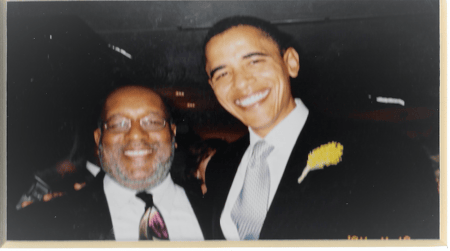Ronald Moore is an alumnx of MSU with a bachelor's degree from the College of Communication Arts and Sciences and has dual graduate degrees from the College of Education in counseling and the School of Human Resources and Labor Relations. He is a retired HR executive at Hewlett Packard and Safe Horizon, a nonprofit in New York City.
What is your involvement with MSU?
I was originally one of the early founding members of the GLBT Alumni Association. That was a group that I was involved with years ago and continue to be involved with. I pledged at a fraternity during my first year at MSU at Kappa Alpha Psi, and I am still active in the fraternity. I am also involved with the MSU Black Alumni, and I've been working with The Gender and Sexuality Resource Center, trying to support LGBT resources.
What is the significance of NFL athlete Carl Nassib coming out?
I think there's power every time somebody comes out. And I believe that Nassib's doing so when he is still in his career is a lot to risk and is a compelling example of his commitment. He has signed a very lucrative contract. So, I give him kudos for his courage and his commitment to doing that.
Obviously, he's not the first gay NFL football player, but he is willing to be himself and being open and, in doing so, he gives permission to LGBT people in all areas, not just NFL athletics.
But there's a risk involved for everybody. Anytime you come out, you risk losing some relationships and you have to be willing to factor that in because you can't always predict the reactions. So, I think it's an act of courage. I also think being the first one of anything — the first Black president, the first Black astronaut — catches a lot of grief but makes it easier for the people behind them.
What is the difference between coming out now versus when you came out?
Coming out was a journey. I came out to my college roommates in 1973; they were the first I've ever come out to. And I was fortunate in that they did not change their attitudes. In a way, they could have made it very, very intolerable for me. And then it was a series of coming out to family members. Coming out at work was the last step because my livelihood was essential to me. I always came out to co-workers with whom I had personal relationships, but I just wasn't out, you know, until about 20 years into it.
Today, I think it's more of a one-shot to telling everybody they're out; once you're out, everybody knows. The other thing is that there are many more role models now than when I was coming out. Every generation has it a little bit easier. The people before me were arrested in the street for coming out and put into insane asylums. That's what happened.
So, I've benefited from their courage. Each generation should carry the ball a little bit forward. I didn't have an Ellen on TV; I didn't have a Will and Grace. At the same time, though, there were still gay teenagers and so forth, who were and are totally isolated and are committing suicide over their sexual orientation. There are still a wide range of realities out there. We can't assume that the battle is over.
I heard you say you took 20 years to come out in your place of work. Why was that? Was that at HP?
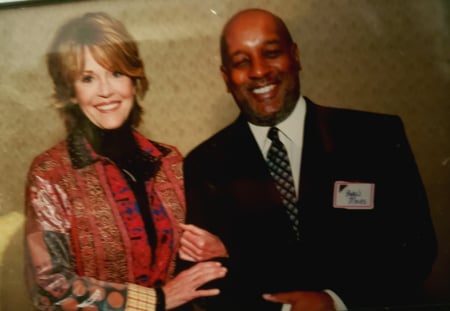
Yeah, it was at Hewlett Packard. I transferred to Atlanta, where I spent my last 12 years with HP and I was responsible HR-wise for a 21-story building with probably 2,200 employees. And I would go to this gay bar and, after a few months, I recognized an employee. When I went over to speak to him, he said, “I saw you here months ago and other people have seen you out. But you didn't know us. So why would we interrupt your evening?”
And that's when I realized I didn't even know when I'd been outed. I was too visible. And by that time, I was out to family and friends. At the time, my boss was in California. I thought, “What does he know but hasn't said?” I decided to tell him, and he said, “So what?” And that was the last door to go through.
Once that was out, the community came calling — the Atlanta LGBT community. I was a high-level corporate person who's African American and who's out. 'Come here. We need you for this committee, that committee.' I used to joke that I was the only LGBT black person in 1999.
I could interact in a community a lot easier because I had the class credentials. I had executive master's degrees; if I were in an hourly position with a high school degree, I would not have been looked at the same.
What are the existing barriers for other people to come out, such as for transgender individuals?
I think the trans community has the current most significant challenge. I think within our [gay] community, we had sort of put them aside. There was a time in the 80s when the gay community could get acceptance for the LGB community. But we must realize none of us are free until all of us are accepted.
So, the big challenge now is to embrace the trans community and understand our own transphobia fully. Especially now, because when you look at trans women of color or transgender people of color, the murder rates are way out of proportion and off the charts. There's so much work to be done in accepting that community.
Would you be comfortable reflecting on your experiences coming out as a Black gay man?
Sure. The challenge for Black people when they come out is the possibility of rejection. If a white person is rejected for being queer, they could still be accepted in Chelsea in New York and access rainbow flag neighborhoods as a place where they could go, but for people of color, that is not the case. We couldn't go there. So that was a real fear. If we came out, we had nowhere safe to go.
And that's one of the reasons why you have a lot of shadow organizations for people of color. Now people say, “Well, how come you have a Black Pride?” That is because we need a place to feel safe, and that's not always in the overall gay community.
I remember one particular dinner in Atlanta, someone was talking about the Civil War, saying it wasn't really about slavery. I was the only Black person at the table and, even though I was in a gay environment, I had to stand up for being Black. When you look at the major LGBT organizations, it's still pretty much dominated by cisgender, white males. It is changing, but it's slow.
June 28th marks the anniversary of the 1969 Stonewall Riots, can you reflect on where you were in your journey?
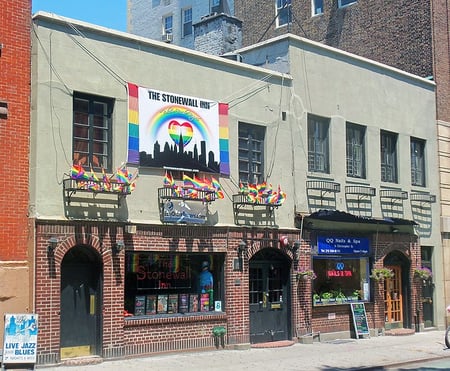
Stonewall had zero impact on me; I was in the 10th grade and it was a New York story. The riots were not made a big deal; remember everybody had riots. By that, I mean they were basically mimicking what Black people had been doing. I grew up in Detroit and we had the '67 riots.
Also, I wasn't coming from a particularly gay perspective. Around that time, I went to the Detroit Public Library and in the card catalog, I looked up “homosexuality,” and the card said “deviancy; see abnormal psychology.” I was at no stage at that point to be marching and saying, “I'm gay and I'm proud and all that.” No, I was trying to change. When I came to Michigan State as a first-year student, I saw a counselor who said he could help me become heterosexual. We were still on the mental disorder list. Homosexuality was considered a mental disorder until the mid-80s.
Stonewall represents people who finally said they had enough, but the other thing that I think we need to remember is that it was essentially a transgender crowd. Transgender people were harassed the most because they couldn't blend in as well. Other people could leave Stonewall, get a block or two away and blend in, but transgender people didn't have that luxury. So, they were the ones that finally stood up and fought back because they had so little to lose.
If you look at the Civil Rights marches, many early marchers were blue-collar, whereas the professional class felt they had too much to lose. When we look at Stonewall, it was transgender people that were on the frontlines because they weren't accepted and didn't have their job at the bank or corporation to lose. And so, we have to remember that as people move up the class ladder, a lot of times, that inhibits their risk-taking.
What role does MSU play in supporting LGBTQA+ students and creating a more comfortable environment?
I think, by and by, MSU needs to put some energy into emphasizing allyship from the heterosexual, cisgender population. Too often, all the effort goes into trying to fix the minority. Yet, it's the overall majority that creates the oftentimes oppressive, unacceptable environment. I think there needs to be a discussion among heterosexual students about being an ally.
When people leave Michigan State and go out into the work world, they're going to encounter all types of people. They must learn how to embrace the diversity that is out there, which they will need to do to succeed in the world. Pride is not just for LBGT students, and Black History Month is not only for Black students. It is not just one group's issue.
What is one takeaway you would like people to have this Pride Month?
Everybody knows somebody who is a member of the LGBT community. You just may not know it, and it may be multiple people. It's never safe to make anti-gay jokes; try to remember we are everywhere. I'm sure some brothers in my fraternity would just cringe at the thought, and there'll be other brothers who are in the closet. Although they have never rejected me, I was terrified that they would know when I was a student. The point is that for the LGBT community, it's just a matter of whether we choose to let you know.
Is there anything else you'd like to add?
Yes, I acknowledge the movement at Michigan State. Dr. Bennett [vice president and chief diversity officer] being appointed at his level and reporting directly to the president. Coming from my corporate and HR background, that is a crucial step. A lot of times, the director of diversity is a lower-level person. So that is a positive. There is movement, but just like in any other matter, change is always a challenge. The university must continue to step up and affirm the members of this diverse community, whether it's race or gender, and continually do that because it can be overwhelming to a student.
Coming from Detroit to Michigan State, I quickly learned what it was like to be the only student of color in the class. There are students who are terrified of somebody finding out about them. There are students who feel that they can never be accepted for who they are. I hope that each person reading this can embrace their own journey. Not only those trying to accept their sexual orientation, but also those struggling to embrace a friend or family member. Allies have a journey as well.
